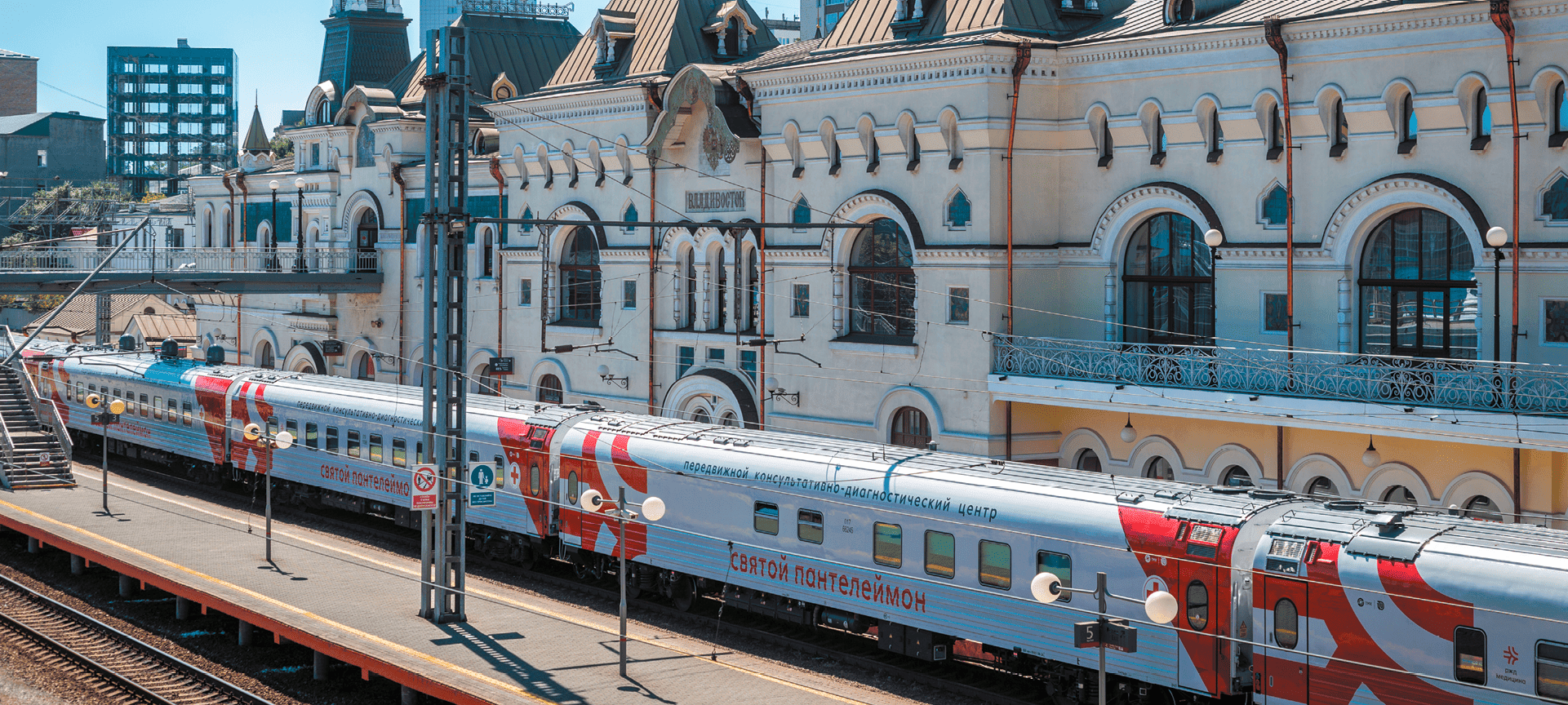Protecting public health in the regions of operation
GRI 3-3
RZD-Medicine at a glance:
- over 400 outpatient and inpatient medical facilities
- 14,600 round-the-clock hospital beds
- 30 million patient visits per year
- over 550,000 patients treated annually
- over 50,000 healthcare professionals
- 71 regions across Russia, from YuzhnoSakhalinsk to Kaliningrad
The professionals of RZD-Medicine provide the full range of healthcare services — from initial consultations to hi-tech medical care. More than 2.2 million people are registered with Russian Railways’ medical institutions, including 1.7 million under the compulsory health insurance (CHI) system.
To boost access to first medical aid and patient satisfaction, fourteen mobile medical units are operational. They offer services including medical screenings, check-ups, vaccinations, and health checks for foreign nationals, capable of conducting up to 336,000 examinations annually.
Saint Panteleimon, a new medical train for the residents of remote Russian regions
In August 2024, we launched the Saint Panteleimon unique mobile consultative and diagnostic centre.
Its main mission is to deliver high‑quality, professional medical care to residents in remote regions of Russia. The train route covers eight Russian regions: the Republic of Buryatia, the Republic of Sakha (Yakutia), Trans‑Baikal, Primorye and Khabarovsk territories, Amur and Irkutsk regions, and the Jewish Autonomous Region.
The Saint Panteleimon train comprises 14 railcars, including six service cars (two residential cars for the staff, an HQ car, a shower car with laundry facilities, a generator car, and a dining car) and eight medical cars (radiology and functional diagnostics cars, two therapy cars, a surgery car, a laboratory, a physician’s lounge, and a registration car). All the facilities are fitted with modern equipment, with corridors, doorways, and restrooms designed to be accessible for people with disabilities.
Patients can receive X‑rays, mammograms, ultrasounds, spirometry, stress testing, and consultations with specialists including an endocrinologist, urologist, surgeon, paediatrician, ophthalmologist, ENT specialist, obstetrician, gynaecologist, and dentist. A unique feature of the mobile medical centre is its use of Celsus, a leading Russian AI solution capable of analysing radiological images with high accuracy.
On average, the train offers treatments to approximately 100 patients daily. Saint Panteleimon is open to all: to see a doctor, patients need to visit the registration car with their ID and CHI policy.
2024 results
- In its first five months of operation, Saint Panteleimon completed eight journeys across six regions of the Far East and Eastern Siberia.
- The total route duration was 115 days and over 10,000 km, covering 81 train stations.
- Doctors gave around 20,000 consultations and performed over 43,000 lab and diagnostic tests, diagnosing more than 4,300 diseases in patients for the first time.
- As a result, nearly 200 patients were referred for inpatient treatment.
The Saint Panteleimon train is equipped with state-of-the-art medical devices capable of performing advanced laboratory and functional diagnostics. As the mobile centre operates in hard-toreach regions, the project holds significant social value for local communities.

Medical mission of Doctor Voyno‑Yasenetsky
In 2024, the Doctor Voyno‑Yasenetsky (Saint Luke) mobile medical centre made 10 trips and visited 77 train stations across the Krasnoyarsk Railway, with 11,500 people from the Krasnoyarsk Territory, the Republic of Khakassia, and Irkutsk and Kemerovo regions receiving dedicated medical care.
For over 16 years, this “health train” has been visiting the most remote stations, giving residents access to professional healthcare. Half of the patients are regular visitors who closely follow the train’s schedule. Before each journey, the medical team contacts local authorities and distributes route information in an attempt to maximise the outreach.
In 2024, thanks to the government support, we acquired new equipment, including ultrasound machines, ECG devices, and an ENT endoscopy unit.

